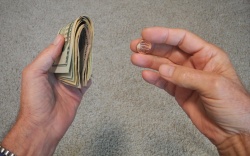Difference between revisions of "Category:Wealth and Poverty"
(copied the content from Portal:Economic Freedom to the page for this category.) |
|||
| Line 8: | Line 8: | ||
<br>Wealth and poverty can be thought of as two sides of the same coin. If you understand wealth, you begin to understand poverty and vice-versa. | <br>Wealth and poverty can be thought of as two sides of the same coin. If you understand wealth, you begin to understand poverty and vice-versa. | ||
| − | [[File: | + | [[File:DSCN0879 wealth and poverty.JPG|250px|thumb|link=]] |
So, what is wealth? <!--CW presents its understanding and it is that which we speak of here. --> | So, what is wealth? <!--CW presents its understanding and it is that which we speak of here. --> | ||
It will be helpful to say what it isn't. | It will be helpful to say what it isn't. | ||
Revision as of 15:11, 24 October 2014
Wealth and Poverty
|
One way to understand American success is to look at its wealth and where it came from and it's poverty and why it exists. Both wealth and poverty are badly misunderstood, which is a problem for honest politics. To understand them is to strengthen our basis for making intelligent political decisions and dispersing the fog of political marketing.
So, what is wealth?
It will be helpful to say what it isn't.
Wealth is having the kind of enduring assets and capacities (work skills, schools, industries, roads, ports, airports, railroads, and a robust and honest society willing to work) that will generate future income and perpetuate wealth.
Poverty can be thought of as lacking that which is wealth.
Viewing poverty only as the absence of wealth also denies us the understanding to be gained by looking at the coin from both sides. Just as understanding wealth helps to understand poverty, understanding poverty provides insights into creating wealth. Articles for this categoryThis category is the place to insert articles about wealth and poverty and income inequality - including their nature and their role in American success or lack of it, economics, and economic freedom, and how these things have been effected by government policy and social customs and mores.
|
CategoriesClick on arrows to see subcategories and articles. Things you can do
|
TBD
Articles
|
Subcategories
This category has the following 2 subcategories, out of 2 total.
